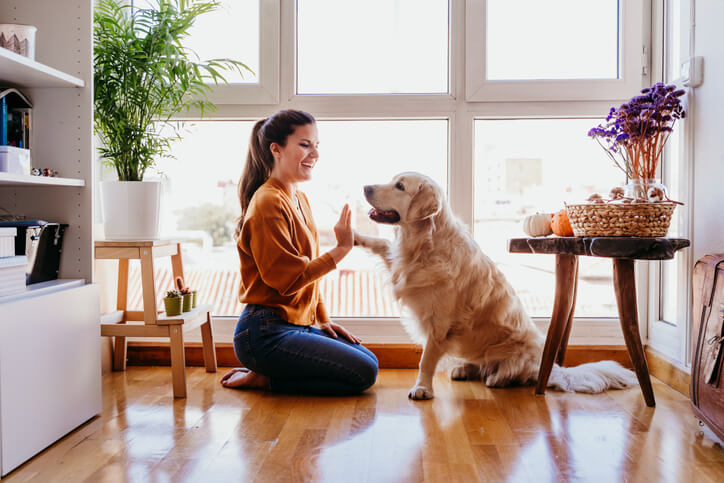Keep Your Landlord & Dog On Good Terms
Dogs, they’re humankind’s best friends; however, frequent misbehavior can cause them to become a landlord’s worst nightmare. Problems such as incessant barking, scratched up floors, and torn-up furniture are inconveniences a landlord would prefer not to deal with, as they can yield complaints and even costly repairs. Therefore, in the interest of keeping dogs and landlords on good terms, The Quad On Delaware presents six tips renters can implement in their apartments that are sure to help curb those canine misconduct.
Looking for pet friendly apartments? Well, look no further than our student apartments in Minneapolis! Complete with luxurious amenities and spacious floor plans, they make the perfect new home for students and their furry friends. Contact us to schedule a tour today!

Deter Barking
Constant barking can bother neighbors to the point they might put in a complaint. A good way to help deter a dog from barking is to make sure they’re getting enough exercise. Incessant barking is often an inquisitive or pleading reaction born from a restless dog’s exposure to external stimuli. Taking dogs on a brisk walk in the morning before heading to work can reduce their likelihood of barking, as they can now rest satisfied while their owners are away. However, if barking continues even after adequate exercise, consider investing in a Citronella collar — a humane alternative to shock collars.
Cover Furniture
As residents of our apartments in Minneapolis, MN can attest — furnished apartments can be a godsend for renters who don’t want to overspend when attempting to fill a new apartment. To be courteous to landlords who offer fully furnished apartments, make an effort to preserve the condition of their furniture. Most dog owners train their pups that getting on furniture is not allowed, however, many of our mischievous companions will do it anyway the moment we’re out of sight. Circumvent this by placing sheets or blankets on furniture before leaving. This will reduce fur, stains, dirt, and even allergens from making their way into the apartment’s furniture.
Leave Toys Out
Making sure dogs have something to do while their main source of entertainment — you — are away will keep them busy and distracted from indulging in misbehaviors. Leaving chew toys or puzzle balls around the apartment is a great way to ensure that pups stay occupied and, even better, happy. Owners who sprinkle toys throughout the apartment will also notice less barking and fewer chewed up furnishings. Remember, when trying to diagnose an animal’s misbehavior, seek to first understand the emotion behind that behavior. If someone suspects their dog acts out because they’re bored, the logical solution is to provide entertainment.
Protect Floors
When a landlord invests in sleek modern upgrades such as wood flooring, they’d prefer not to see it become scratched up. A guaranteed way to limit damage to floors is by keeping your dog’s nails trimmed. Regular grooming will also help alleviate misbehavior born from irritation or anxiety, as having a dog professionally pampered will help them stay relaxed and healthy. It’s also recommended to place area rugs on the floors of rooms a resident spends the most time because, subsequently, that’ll be where loyal pups spend most of their time as well. Placing a mat under food and water bowls can also help prevent spills that may cause water damage to the flooring.
Establish Routine
Pet owners who accustom their dogs to a schedule will reduce their pups' anxious behaviors associated with uncertainty. Most notably, taking a dog out to potty at the same time before leaving for work and immediately upon returning home each day will prevent indoor accidents. A dog who knows when they’re owner will return home, is more likely to be patient as opposed to going on the floor. Odors from pet accidents linger in apartments, particularly those with carpet, and may require professional cleaning or re-flooring services if the problem is consistent, so it’s best to establish a routine to help avoid this.